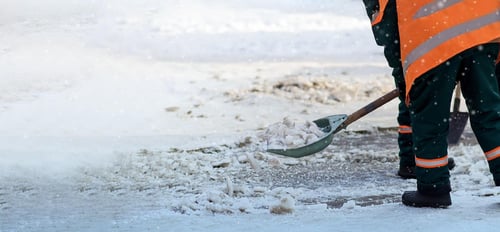
As the winter months approach Texas, it is essential to remember how to prepare and protect property and employees from potential damage from the cold. Severe weather conditions can cause employees injuries, auto accidents and property damage. The following are some tips to keep in mind during cold-weather season.
Protecting Facilities
Several steps can be taken to properly maintain facilities for the year-round protection against weather-related issues. Portable or temporary heaters should only be used in emergency situations and never with extension cords. Ensure adequate ventilation, and make sure the heater is functioning properly and kept well away from combustible materials.
Fully insulate all water pipes and replace damaged insulation. Both copper and PVC pipes may crack or burst when frozen, and both types of materials need to be thawed if they become frozen. Locate the water shutoff valve to the facility and adequately train staff how and when to turn off the water to a building. Make sure shutoffs are readily identifiable and visible. Regular, periodic testing of the water shutoff valve should be conducted to ensure proper working conditions when the need arises. Exterior faucets should be drained, hoses disconnected and properly insulated with materials such as Styrofoam to prevent cold air from entering the faucet opening.
Thawing Frozen Pipes
If you suspect that a pipe is frozen, make sure the faucet is open before thawing. Never force the valve to open. Water will begin to flow as you treat the frozen area, which will help to melt ice in the pipe. Before thawing, check for broken and cracked pipes. If this is the case, turn off the main valve to the building until the leak is repaired. Apply heat to the frozen portion of the pipe by using an electric hair dryer, a portable space heater, or by wrapping pipes with towels soaked in hot water. Make sure that electrical cords and appliances do not come in contact with water. Do not attempt to use a blowtorch, kerosene or propane heater, charcoal stove or other open-flame device. Flames present a serious fire hazard and may release lethal carbon monoxide fumes in the air. Apply heat until full water pressure is restored.
Property located in South Texas demands special attention to exposed water pipes during the winter months. Freezing pipes can be a problem in warmer climates where they often run through uninsultated or under-insulated attics or crawl spaces. Although some areas freeze only a few times per year, it's still necessary to protect exposed water pipes.
Unoccupied or Vacant Buildings
Winterize unheated, unoccupied or vacant buildings. Sprinklers or water lines in unheated attics or dead air spaces near outside walls are particularly vulnerable to freezing, as are pipes in areas exposed to strong winds, outside taps and in cooler areas. Ensure the building heating system is turned down rather than completely off when a building is unoccupied. Even the smallest amount of warm air circulating throughout a building may be adequate to prevent freezing.
Generators
Ensure generators are properly maintained and tested at actual load conditions at least quarterly. Ensure adequate fuel supplies are on hand and that they have been refreshed periodically.
Protecting Your Employees
Strong winds and high humidity levels can increase the dangers of the cold. Watch for signs of cold stress and provide appropriate rest periods. Using appropriate personal protecting equipment and work practices will reduce the risk of exposure to cold weather.
Wear Proper Clothing
Protective clothing is the most important way to avoid cold-weather issues. The fabric makes a difference. Cotton loses its insulation value when it becomes wet. Wool, silk and most synthetics, on the other hand, retain their insulation value even when wet. Do not underestimate the wetting effects of perspiration. Often, venting and removal of the body's sweat and heat are more important from rain or snow. Keep a change of dry clothing available in case clothes become wet.
Wear at least three layers of clothing, including an inner layer of wool, silk or synthetic material to take moisture away from the body, a middle layer of wool or synthetic material to provide insulation even when wet, and an outer wind- and rain-protective layer that allows some ventilation to prevent overheating.
Wear a heat and keep your ears and hands warm by wearing earmuffs and gloves. Wear good footwear that is insulated, along with proper socks. Change wet socks periodically if they become moist from damp weather or sweating.
Stay Hydrated
Stay hydrated and avoid fatigue since energy is needed to keep muscles warm. Drink plenty of liquids, avoiding caffeine and alcohol. It is easy to become dehydrated in cold weather.
As the temperature drops for the winter, take precautions to protect property and employees from the dangers of cold weather. Keep in mind these tips for severe cold temperatures.
The Texas Municipal League Intergovernmental Risk Pool is the leading provider of workers’ compensation, liability, and property coverage for local governments in Texas. Founded in 1974, we are the oldest and largest pool of its type in the United States, serving over 2800 governments and political subdivisions. We are driven to continue the mission that began over 40 years ago, providing our members with a tailored risk financing system through reliable partnership, performance, and service.
If you are currently looking for coverage, or have any questions please contact our team with any questions.





